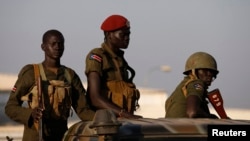Henry Lugale has spent the week since he got to Nairobi thinking about the nightmare that life has become back in Juba.
"There were people suffering. South Sudan is not good," he told South Sudan in Focus.
Before the conflict started in December, Lugale was a businessman, running a popular store in Juba’s Tomping neighborhood. When violence erupted on Dec. 15, things got so bad that Lugale practically lost the roof over his head.
“Because our home was near the home of the president – these people come and they ruin all the things in the store," he said.
"And I have some solar (panels) on the top. They removed the solars and even they took my car. Soldiers. Tiger soldiers,” he said.
Tiger soldiers
By "tiger soldiers" Lugale meant members of President Salva Kiir’s presidential guard, also called the Tiger Division. Lugale said the same soldiers man some of the checkpoints that are dotted around Juba. They used to stop him several times a day, asking him each time to get out of his car and often confiscating his belongings or demanding money, he said.
South Sudan Information Minister Michael Makuei said checkpoints are normal in times of trouble, and speculated that Lugale had resisted security officials who were merely doing their job.
"Anybody who decides to be intransigent, anybody who wants to go against the law, anybody who wants to take the law into his own hands, these are the people who must be handled. And if he happened to be one of those intransigent ones, then, definitely, he could have an encounter with the checkpoint," Makuei said.
Ethnic differences
Lugale insisted he was doing nothing wrong. He said the soldiers at the checkpoints harass people like him – because he is not from the same ethnic group as they are.
One time, he says, when he was on his way to pick up some items on a list for his shop, he was stopped at a checkpoint.
“'Where are you going to?'" he recalled the soldiers asking him.
"I say, 'I’m going to Torit.' 'Where are you from?' I say, 'I’m from town.' 'So which tribe are you?' I say,'I’m Baria.' 'So why are you going to Torit if you’re Baria?'"
Then, Lugale said the soldiers told him they were going to arrest him. When he asked them why, he said they told him it was because of his shopping list, which they said was a list of people's names. They also said they were taking his iPhone, which had pictures on it of the January 2011 referendum, in which South Sudanese voted overwhelmingly for independence from Sudan.
Makuei expressed surprise when he was told the story of the referendum pictures, but said Lugale probably had something else on his phone.
“How can you be prevented from carrying pictures of people who are celebrating the referendum?" he asked.
"This cannot be accepted by a sober mind. He must have been carrying other pictures which he knows. Otherwise, nobody will ever stop me from carrying pictures of my celebration," the minister said.
Tired of being harassed
Lugale insisted that his version of the story was true. He said he eventually fled Juba because he got tired of being stopped, harassed, and having to pay kickbacks or hand over his belongings to soldiers at checkpoints.
“Ah – you cannot be free, because there are so many checkpoints in the town. There are soldiers there -- operations soldiers. They are there, they are checking the cars," he said.
Karin Zeitvogel contributed to this report from Washington







